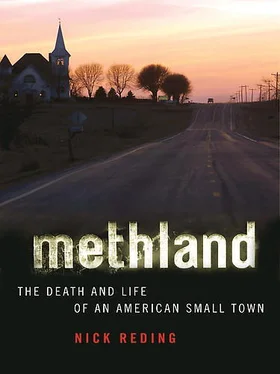According to the story that Logan tells, the charges filed against him accused Logan of routinely setting up surveillance near the girl’s house, only to use binoculars to ogle her in her bedroom. Several times, it was alleged, he sneaked up to the girl’s window at night as she undressed and masturbated in the bushes. Logan denies the charges vehemently, and maintains that they were payback for questioning the former chief’s authority. It wasn’t long before Logan’s home life was a shambles. His wife threatened to leave him. Unable to find another job, Logan was going broke. The legal bills alone were ruining him, he says. So he violated the unwritten code that is often referred to as the Blue Wall, by which police officers refuse to publicly discuss departmental conflict. Logan told Larry Murphy everything he knew about the department and its officers, and how he was being set up. Thus began the first few months of Larry Murphy’s first term as mayor, in 2002. By the end of that year, Logan—so recently fearful of jail time—had been made chief of police.
The Logan case still lingers around town these days, much like the specter of the Mob. A lot of people, Mildred Binstock included, think Logan did it. And a lot of other people think he didn’t, and that the whole case was another example in a long line of shady insider dealings in town. According to Nathan Lein, former mayor Gene Vine, who sat on the city council until his death in 2008 from cancer, told Larry Murphy to get rid of Logan. Whether guilty or innocent, Logan was too much of a liability, said Vine. The county attorney, Wayne Sauer, said the same thing. The only thing that everyone can agree on, as Nathan put it, is that “making Jeremy Logan the Oelwein chief of police took major nuts.” That, and Logan has been hell on meth cooks.
According to Logan, the Oelwein Police Department, which has jurisdiction only within the four-square-mile incorporated area of town, was dismantling two meth labs per month back in 2002, his first year as chief. Labs could be anything from a house with a fairly complex setup in the basement to a guy and his wife single-batching in a Johnny on the Spot behind the dugout at the Sports Complex. No matter where the labs were, though, the Oelwein police were exposed to the toxic waste and the harmful fumes while wearing nothing more than their regular uniforms. As recently as the late 1990s, Logan told me, the police, unsure of what to do, let labs burn. Other times, knowing how much it would cost to clean them up, the police burned the labs themselves.
Anecdotally across the nation, cancer rates among first-responders to meth disasters have been climbing since the 1980s. Bill Ruzzamenti, a former DEA agent and the current director of the Central Valley High Intensity Drug Trafficking Area (HIDTA) in California, likes to tell the story of how he smelled so bad after dismantling superlabs in San Diego during the 1990s that his wife would have to hose him down in the garage and burn his clothes. Still, said Ruzzamenti, the stench of ether and what smelled like cat urine would be so thoroughly soaked into his hands that they’d have to throw their phone away each month: the receiver and keypad stunk too bad to keep using.
As a result, DEA, in conjunction with the Environmental Protection Agency, passed a law in 2003 providing a standardized protocol for anyone given the task of dismantling a meth lab. The training necessary is available only at the Federal Bureau of Investigation headquarters in Quantico, Virginia. Finding money to send someone for training is not easy, says Logan, although the alternative seemed to him far worse: years of lawsuits when one of his men got cancer. Upon becoming chief, Logan immediately demanded that an Oelwein officer be sent for training. By the time that officer had completed the course, in 2003, the town’s so-called Beavis and Butt-Head meth problem had increased to an almost incomprehensible order of magnitude: Logan and his officers were being called, on average, to one meth lab every four days. And every lab that got cleaned up cost the town an average of six thousand dollars.
Logan has a long list of disaster and near-disaster stories when it comes to meth. He also has enough cynicism to see the humor in places where, for many people, the joke would be obscured. One story is of an ex-Marine sharpshooter who was also a prolific meth cook and lived alone with his teenage daughter, whom Logan describes as an academic star at Oelwein High School. In 2003, increasingly paranoid that he would get caught making meth, the ex-Marine knocked out all the windows from his home and replaced them with black plastic garbage bags taped to the frames, thereby keeping people from looking in. They also provided a good way to defend the house, for he’d cut holes in the center of the bags from which he planned to shoot whoever came to shut down his lab. Near the windows, he had placed nineteen firearms of various kinds, along with seven thousand rounds of ammunition. What Logan thinks is funniest about the story is not that the ex-Marine aroused his neighbors’ suspicions by going outside in his underwear to dance in the street in the middle of the day; or that his daughter was home at the time, studying; or that the man, when the police came, tried to hide by lying still in the concrete gutter of the street, thinking he was camouflaged. What gives Logan a laugh is that the man had the most firepower stacked around the house’s highest windows, those in his daughter’s room, which provided the best vantage points for shooting. There he had two AR-15 fully automatic assault rifles, a Remington 12--gauge shotgun, and seven hundred rounds of ammunition. “Had he not decided to lay down and hide in the gutter,” said Logan, laughing, “there’s no question he would have killed every single one of us.”
Starting in 2004, Logan, with the blessing of Nathan Lein, demanded that his men pull over cars for what Nathan describes as “every little ticky-tack violation that gets us to the vehicle”: a cracked taillight; going five miles per hour over the speed limit; a dirty license plate; or a broken headlight. In addition, Logan schooled his men to use their familiarity with people they questioned to their advantage, and to use history and common knowledge to garner information and to catch people in lies. No more niceties and letting people off for having had a little too much to drink. Search every vehicle. Assume everyone is guilty and put the screws to them. Make them nervous. Logan instigated the practice of leveraging jail time in order to develop confidential informants, in hopes of getting those informants to give up their friends who were batching with them. Never mind if you went to high school with a guy or grew up on the farm next to him. This was like a war.
For some people, these tactics, while legal, defied the very foundations of life in a small town, where people’s familiarity with one another means everything. Logan’s attitude smacked of the sleight of hand and outright trickery associated with an urban existence. Mildred Binstock called Logan a Nazi. It was Logan who was the criminal, she said. Mildred was not the only one who felt this way. One morning at the Hub City Bakery, I overheard an octogenarian farmer declare to his coffee mates that, in an earlier time, a man like Logan could have easily been made to disappear.
To other people, though, Logan was a godsend. They felt the tweakers deserved no better. Even as the debate raged and people divided over their feelings, Logan’s tactics worked. Lab busts fell steadily until, during the last four months of 2005, the Oelwein police didn’t dismantle a single meth lab in town. By then, the city council had passed the ordinance calling for the demolition of derelict houses, which in many cases had been turned into meth labs. The town offered sales tax incentives to allow neighbors to purchase run-down homes that didn’t—or couldn’t be made to—comply with the new codes. That, or the council sold the concept of bulldozing under the more politic auspices of “adding green space.” Some people said Murphy and Logan were running people out of town and picking on those who could least afford to fight back. Roland Jarvis accused Murphy of trying to salve Oelwein’s economic woes by sacrificing the poor at the time when they were most vulnerable.
Читать дальше












